AI in Sports is an revolutionary transformation thanks to Artificial Intelligence (AI) integration. This transformation is not just about the incremental enhancement of athletic performance or fan engagement; it represents a paradigm shift in how sports entities—teams, coaches, athletes, or leagues—approach the science of sports. AI’s ascendancy in this domain is propelled by its unparalleled ability to digest, process, and analyze data at a scale and speed beyond human capabilities. This ability transforms coaching methodologies, athlete performance analysis, and fans interacting with their favorite sports.
1. The Increasing Use of AI in Sports
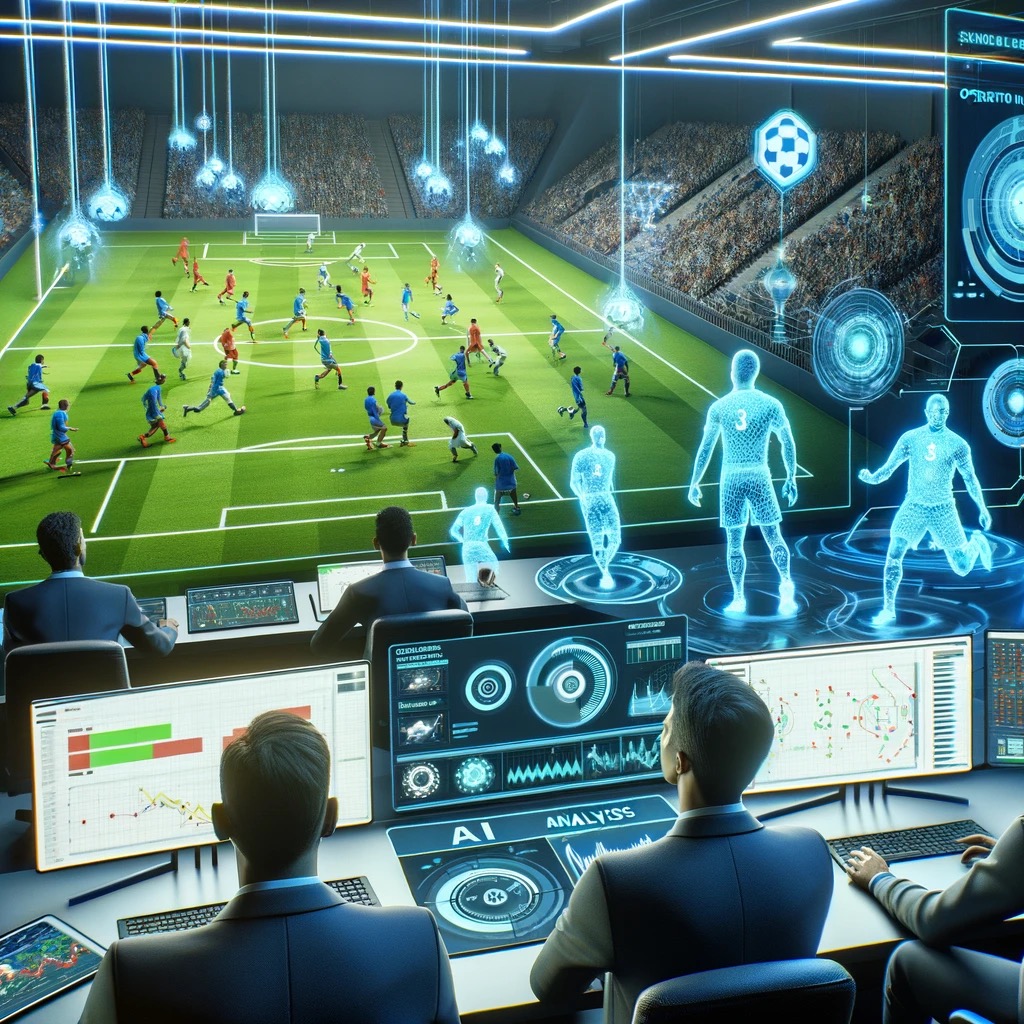
Revolutionizing Coaching and Performance Analysis
At the heart of AI’s impact is the transformation of coaching and performance analysis.
Traditionally reliant on observable metrics and the experienced eye of the coach, these domains are now empowered by AI to delve deeper into the nuances of game strategy and player performance.
AI tools and platforms analyze vast amounts of data from various sources, including video feeds, wearable devices, and player health records, to provide previously inaccessible insights.
This data-driven approach allows for identifying patterns, tendencies, and opportunities for improvement that can be tailored to the individual athlete or team strategy, offering a competitive edge that is finely tuned to the dynamics of modern sports.
Enhancing Athlete Development
AI’s influence extends significantly to athlete development, which monitors health, optimizes training, and prevents injuries.
By analyzing biometric and performance data, AI systems can predict the risk of injuries by identifying athletes’ stress points and fatigue levels.
This predictive capability enables personalized training regimens that aim to peak athlete performance and minimize the risk of injury, ensuring longevity and a healthier career span for athletes across various sports disciplines.
Transforming Fan Engagement
Beyond coaching and athlete development, AI is redefining fan engagement.
In an era where the digital experience is as crucial as the physical, AI technologies offer fans personalized and interactive engagement with their favorite teams and athletes.
From AI-driven recommendation engines curating content based on individual preferences to interactive platforms that provide real-time game analytics and insights, AI enriches the fan experience, making it more immersive and engaging.
Moreover, AI applications in social media analytics enhance fan interaction with sports brands, creating a more connected and dynamic sports community.
AI in Broadcasting and Content Creation
The influence of AI also permeates sports broadcasting and content creation, where automated systems now generate highlights, conduct game analyses, and even create predictive narratives about future matches.
This enhances content quality and relevance and tailors the broadcasting experience to individual viewer preferences, revolutionizing how sports content is consumed and appreciated.
Navigating Challenges and Ethical Considerations
As AI continues to enter sports, it raises challenges and ethical considerations, particularly concerning data privacy, fairness, and the integrity of competition.
The balance between leveraging AI for competitive advantage and maintaining sportsmanship and moral standards is delicate and requires ongoing dialogue and regulation.
The integration of AI in sports is a testament to the profound impact of technology on enhancing human capabilities.
As AI technologies evolve and mature, their potential to further revolutionize sports is immense.
From transforming athlete training and performance analysis to redefining fan engagement and content consumption, AI stands at the forefront of this new era in sports.
Encouraging responsible innovation and ethical considerations will be vital to harnessing the full potential of AI in sports, ensuring that the future of sports is not only technologically advanced but also inclusive, fair, and respectful of the principles that make sports a beloved global phenomenon.
2. AI in Performance Analysis and Athlete Development
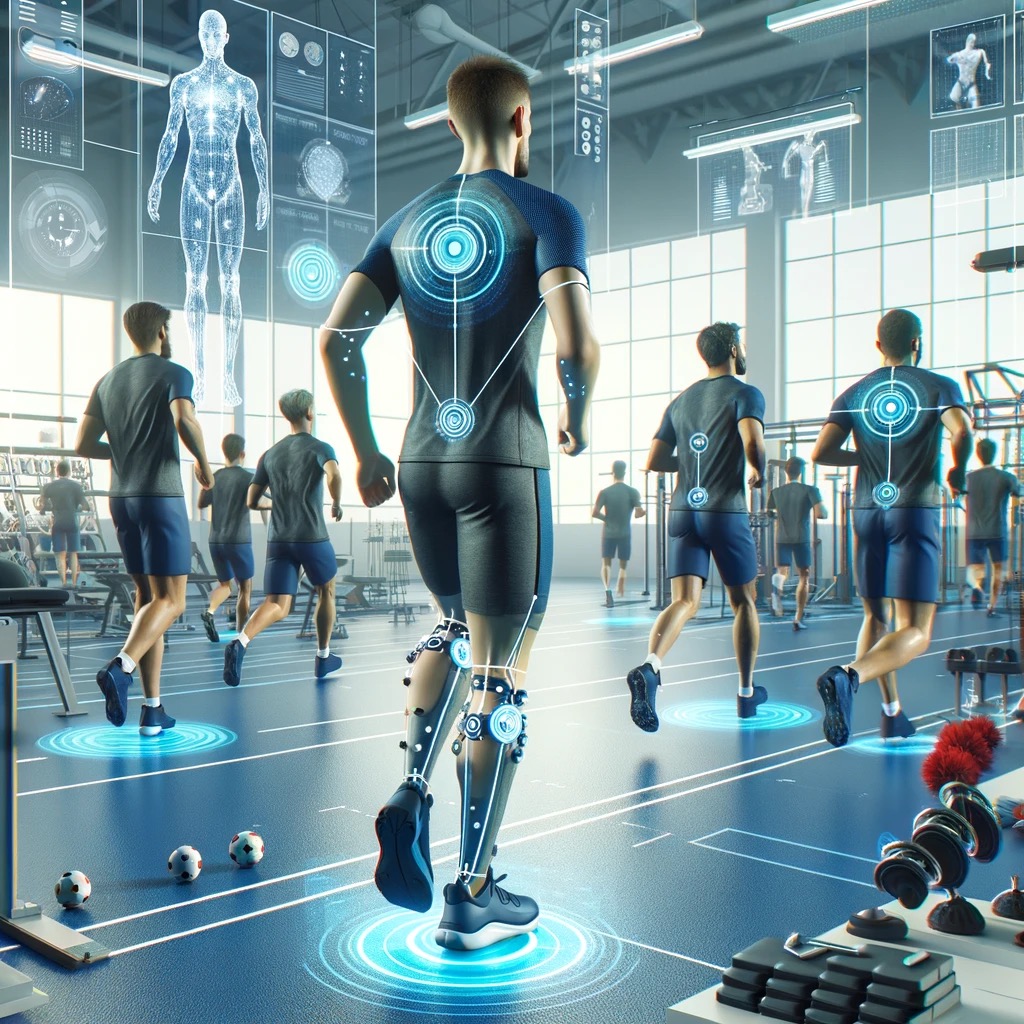
The infusion of Artificial Intelligence (AI) into performance analysis and athlete development is reshaping the competitive sports landscape.
This transformation goes beyond the traditional boundaries of human observation and statistical analysis, leveraging AI’s capability to process complex datasets and provide insights that significantly enhance athletic performance.
The use of AI in this domain encompasses a broad spectrum of applications, from analyzing player performances and health monitoring to injury prevention and personalized training programs, illustrating the profound impact of technology on sports science.
Analyzing Player Performances
AI-driven analysis tools are pivotal in dissecting player performances across various sports.
By processing data collected through sensors, video analysis, and wearable technology, AI systems can evaluate an athlete’s movements, stamina, technique, and overall game strategy.
These analyses offer objective insights into strengths and weaknesses, enabling coaches and athletes to make data-informed decisions about training focus areas, technique adjustments, and game-day strategies.
For instance, motion analysis software uses machine learning algorithms to assess the efficiency of an athlete’s movements, providing feedback that can lead to significant improvements in performance.
Health Monitoring and Injury Prevention
One of the most promising applications of AI in sports is health monitoring and injury prevention.
Wearable devices with AI algorithms track vital health metrics such as heart rate variability, sleep quality, and recovery rates, offering a comprehensive view of an athlete’s physical condition.
AI models analyze this data to identify patterns that may indicate fatigue, overtraining, or the risk of injury, allowing for timely interventions.
This proactive approach to health management helps in tailoring training programs to the individual needs of athletes, significantly reducing the risk of injuries and optimizing physical performance.
Enhancing Athlete Training and Development
AI technologies have revolutionized the way athletes train and develop their skills.
Virtual reality (VR) and augmented reality (AR) systems powered by AI simulate real-game scenarios, providing a highly immersive training environment.
These simulations allow athletes to practice specific game situations repeatedly, improving decision-making, reaction times, and tactical awareness without traditional training methods’ physical wear and tear.
Moreover, AI-driven performance benchmarks and predictive analytics help set personalized training goals and measure progress, ensuring that athlete development is targeted, efficient, and continuously optimized.
Examples of AI-driven Technologies in Sports
Several sports organizations and teams have adopted AI-driven technologies to gain a competitive edge:
- NBA and Second Spectrum: The NBA uses Second Spectrum technology to analyze player movements and game strategies. This system gives coaches and players detailed insights into shooting efficiencies, defensive tactics, and player spacing, influencing game plans and player development strategies.
- Catapult Sports: Catapult’s wearable technology is widely used in various sports to monitor athlete performance and health. These devices collect data on movement, impact, and workload, which AI analyzes to provide feedback on performance optimization and injury risk reduction.
- WHOOP Bands: WHOOP bands are wearable devices that monitor physiological data to optimize training, recovery, and sleep for athletes. The AI algorithms in WHOOP analyze data trends to provide personalized recommendations, helping athletes achieve peak performance.
The integration of AI in performance analysis and athlete development is a testament to the transformative power of technology in sports.
By providing detailed insights into player performances, enabling proactive health monitoring, and enhancing training methodologies, AI technologies are setting new standards for athletic excellence.
As these technologies evolve and become more sophisticated, their potential to further revolutionize athlete training and development is boundless, promising a future where sports performance is optimized to previously unimaginable levels.
3. AI in Game Strategy and Tactics
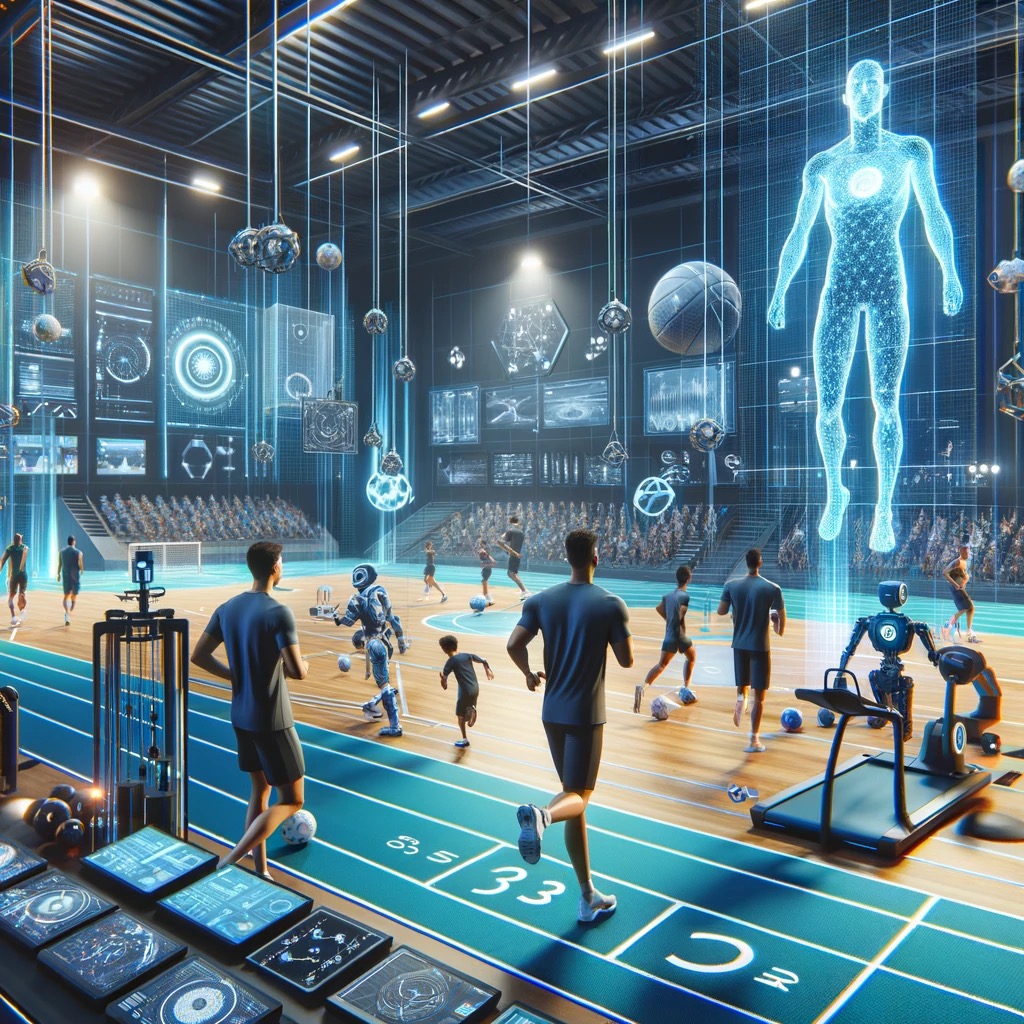
The strategic landscape of competitive sports is being profoundly reshaped by the integration of Artificial Intelligence (AI).
This innovative intersection between technology and sports strategy revolutionizes how games are played, planned, and won.
AI’s role extends from assisting coaches and teams in developing game strategies to facilitating real-time decision-making during play, showcasing its pivotal role in enhancing competitive edge and tactical sophistication.
AI’s Assistance in Strategy Planning
AI systems, through their ability to analyze vast datasets, are transforming the planning of game strategies.
By sifting through historical game data, player performance statistics, and even opponent analysis, AI can identify patterns and tendencies that are invisible to the human eye.
This deep analytical capability allows teams to tailor their strategies based on the strengths and weaknesses of their opponents, as well as optimize their lineup and game plans.
For instance, AI can suggest adjustments in team formations, recommend defensive tactics against key opponents, or identify the most effective offensive strategies based on predictive modeling.
Real-Time Decision Making with AI
One of AI’s most exciting applications in sports is its contribution to real-time decision-making.
During live games, AI systems can process real-time data from the field, providing coaches with instant insights that can inform tactical adjustments.
This includes changes in player positioning, substitutions based on fatigue levels, or shifts in play styles to exploit opponents’ weaknesses identified during the game.
The dynamic nature of AI-driven analytics ensures teams remain adaptable and responsive, significantly enhancing their ability to outmaneuver competitors.
Case Studies of AI Applications in Sports Strategy
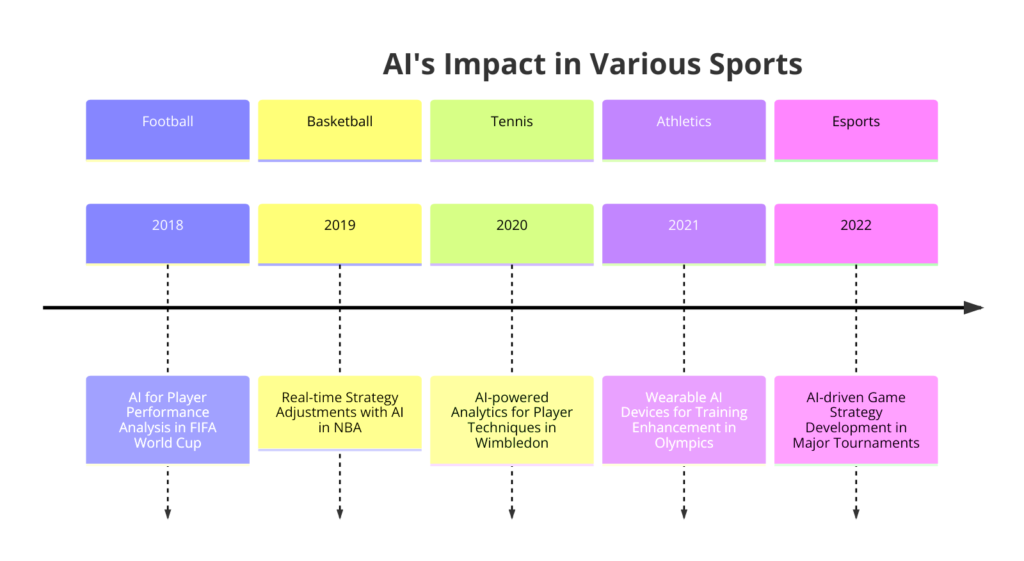
Several high-profile case studies exemplify the transformative impact of AI on game strategy and tactics:
- FC Barcelona and AI in Soccer Tactics: FC Barcelona, one of the world’s leading soccer clubs, has employed AI to optimize team performance and strategy. By analyzing match footage with AI algorithms, the club can dissect opponents’ play styles, strategize player movements, and improve tactical decisions, enhancing individual and team performances.
- NFL Teams Using AI for Play Analysis: NFL teams utilize AI to analyze plays and player movements in American football. This analysis helps coaches devise game strategies that maximize their team’s strengths and exploit opponents’ vulnerabilities. By examining thousands of game scenarios, AI assists in developing highly effective offensive and defensive plays.
- NBA and Player Tracking Technology: The NBA uses AI-powered player-tracking technology to enhance game strategies. This technology tracks player movements, ball positions, and game dynamics, providing coaches and players with insights that influence game tactics, player matchups, and defensive strategies.
AI’s Impact on Training and Preparation
Beyond game-day decisions, AI’s strategic analysis influences training and preparation. Teams use insights derived from AI to focus their training sessions on specific tactical scenarios, simulate opponent strategies, and improve players’ understanding of game dynamics.
This targeted approach to training ensures that players are better prepared for the diverse challenges they will face in competition, directly translating AI’s strategic insights into tangible performance improvements on the field.
AI’s integration into game strategy and tactics marks a significant evolution in competitive sports.
AI technologies are becoming indispensable tools for coaches and teams aiming for the pinnacle of sports performance by offering deep analytical insights, assisting in real-time decision-making, and enhancing strategic preparation.
As AI systems continue to advance, their potential to further innovate sports strategy and tactics promises to elevate the competitive landscape to unprecedented levels of sophistication and intelligence.
This ongoing fusion of AI and sports strategy changes how games are played and won, heralding a new era of data-driven competition.
4. AI in Fan Engagement and Experience
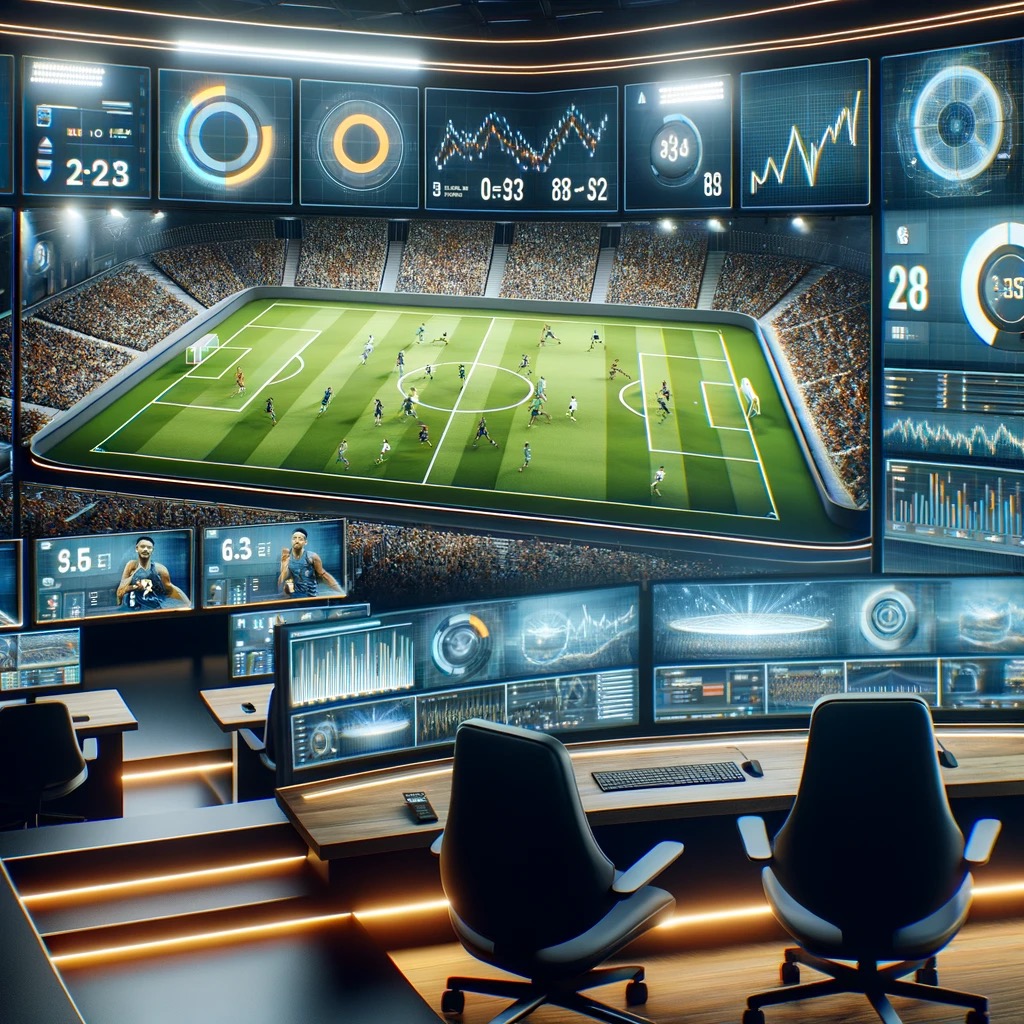
The role of Artificial Intelligence (AI) in transforming fan engagement and experience in sports is profound and multifaceted.
As sports organizations strive to provide fans with more personalized and immersive experiences, AI technologies have emerged as critical enablers, enhancing how fans interact with their favorite teams and athletes online and in physical venues.
This section explores the innovative applications of AI designed to deepen fan engagement and enrich the overall sports experience.
Personalizing Fan Experiences with AI
One of AI’s most significant impacts on fan engagement is personalizing the fan experience.
AI algorithms analyze individual fan preferences, behaviors, and interactions to deliver tailored content, recommendations, and communication.
This can range from personalized video highlights and articles to customized merchandise offers and game-day experiences.
For example, streaming platforms use AI to suggest matches or content based on a fan’s viewing history, while sports apps provide personalized news feeds and match updates.
Interactive Platforms and Real-Time Engagement
AI-powered chatbots and virtual assistants offer fans real-time interaction and access to information, enhancing engagement and convenience.
These AI tools can answer queries, provide game statistics, and even offer insights into player performances, creating a more interactive and informative fan experience.
Moreover, AI is used in predictive games and fantasy sports, where fans predict match outcomes or player performances, adding an engaging layer of competition and involvement with the sport.
Enhancing In-Stadium Experiences
AI technologies improve the fan experience within the stadium by streamlining operations and offering unique engagement opportunities.
Facial recognition technology can expedite entry processes, while AI-powered cameras can capture fan reactions and display them on big screens, creating memorable moments.
Additionally, AI-driven apps can guide fans to their seats, offer real-time concession stand wait times, and even provide AR overlays during the game, offering stats and player information directly to fans’ smartphones.
Innovations in AI for Fan Engagement
Several innovative applications of AI stand out in enhancing fan engagement:
- Virtual Reality (VR) Experiences: AI-enhanced VR allows fans to experience games from unique perspectives, such as the viewpoint of a player or coach. This immersive experience brings fans closer to the action and offers a sense of presence at games they cannot attend in person.
- Social Media Interaction: AI tools analyze social media activity to gauge fan sentiment and trends, enabling sports organizations to tailor their communication and content strategies. AI-generated content, such as automated highlights or data-driven insights, enriches social media engagement and keeps fans connected and informed.
- Dynamic Ticket Pricing: AI algorithms analyze various factors, including demand, seat location, and historical data, to adjust ticket prices in real-time. This dynamic pricing model can improve stadium attendance and ensure fans can access tickets at the best possible price.
Case Studies: AI Enhancing Fan Engagement
- NBA and Next-Gen Stats: The NBA uses AI to offer fans next-gen statistics, providing deeper insights into games and player performances. This data-driven approach enriches the fan experience, offering new ways to understand and engage with basketball.
- FIFA World Cup and AI-Powered Highlights: During the FIFA World Cup, AI created real-time video highlights, quickly identifying key moments in matches to deliver instant content to fans worldwide, enhancing global engagement with the tournament.
AI’s impact on fan engagement and experience in sports is transformative. It offers personalized, interactive, and immersive ways for fans to connect with their favorite teams and athletes.
The potential for even more innovative and engaging fan experiences is vast as AI technologies evolve.
By leveraging AI, sports organizations can deepen fan loyalty and satisfaction and attract new audiences, ensuring sports’ enduring popularity and financial sustainability in the digital age.
5. AI in Sports Broadcasting and Content Creation
Integrating Artificial Intelligence (AI) in sports broadcasting and content creation significantly evolves how sports content is produced, distributed, and consumed.
AI technologies are streamlining the production process and enhancing the personalization of content delivery to sports fans, revolutionizing the viewer experience.
This transformation is driven by AI’s ability to analyze vast amounts of data, recognize patterns, and automate content creation, allowing for more dynamic and engaging sports broadcasting.
Automated Content Creation and Highlight Generation
One of the standout applications of AI in sports broadcasting is automated content creation, particularly in highlight generation.
AI algorithms can analyze live sports footage in real time to identify critical moments, such as soccer goals, basketball baskets, or football touchdowns.
These moments are automatically compiled into highlight reels, significantly reducing the turnaround time from live action to highlight distribution.
This capability not only enhances the fan experience by delivering timely content but also supports broadcasters and content platforms in managing the vast amount of content generated across multiple games and events.
Personalized Content Delivery
AI is transforming content delivery by enabling highly personalized viewing experiences.
Leveraging machine learning algorithms, broadcasting platforms can tailor content to individual preferences, suggesting games, highlights, and analysis based on the viewer’s past behavior and stated interests.
This level of personalization ensures that fans are more engaged with the content, increasing viewership and loyalty.
Furthermore, AI-driven insights can be used to customize advertising and promotions, enhancing the commercial viability of sports broadcasting.
AI-Driven Analytics for Enhanced Viewing
Beyond content creation and personalization, AI enriches sports broadcasting by providing deep analytics and insights that add layers of understanding to the game.
AI systems can track player movements, calculate performance metrics, and generate statistical analyses, offering viewers a more detailed understanding of the game dynamics.
This analytical depth appeals to casual fans and enthusiasts, offering new perspectives on player performances, team strategies, and game trends.
Innovations in AI for Sports Broadcasting
Several innovative AI applications are shaping the future of sports broadcasting:
- Automated Camera Systems: AI-powered cameras can follow the action without human intervention, ensuring that crucial moments are captured and broadcasted precisely. These systems can adapt to the game’s pace, providing dynamic angles and perspectives that enhance the viewing experience.
- Voice Recognition for Commentary Generation: AI technologies capable of voice recognition and natural language processing can generate automated commentary, providing insights and narratives accompanying live action. This technology can be tailored to offer commentary in multiple languages, expanding the global reach of sports content.
- Virtual Commentators and Hosts: AI can create virtual commentators and hosts for pre-game, halftime, and post-game shows, offering analysis and entertainment. These virtual personalities can interact with real-time data and social media trends to deliver engaging content.
Case Studies: AI Transforming Sports Broadcasting
- Wimbledon and IBM Watson: Wimbledon has utilized IBM Watson to create automated highlight packages. Watson analyzes match footage, crowd noise levels, and player movements to identify and compile highlights, significantly enhancing content delivery for tennis fans.
- NBA and Automated Game Recaps: The NBA employs AI to produce automated game recaps and player highlight reels. This technology allows for quick content turnaround, ensuring fans have access to highlights across the league’s extensive game schedule.
AI’s impact on sports broadcasting and content creation is transformative, offering unprecedented levels of automation, personalization, and analytical depth.
As AI technologies evolve, the potential for further innovation in sports media is immense. This ongoing transformation enhances the fan experience and opens new avenues for content monetization and distribution, ensuring that sports broadcasting remains at the forefront of digital media innovation.
The integration of AI in this field is changing how sports content is produced and consumed and how it is valued in the digital age.
6. Challenges and Ethical Considerations in AI for Sports
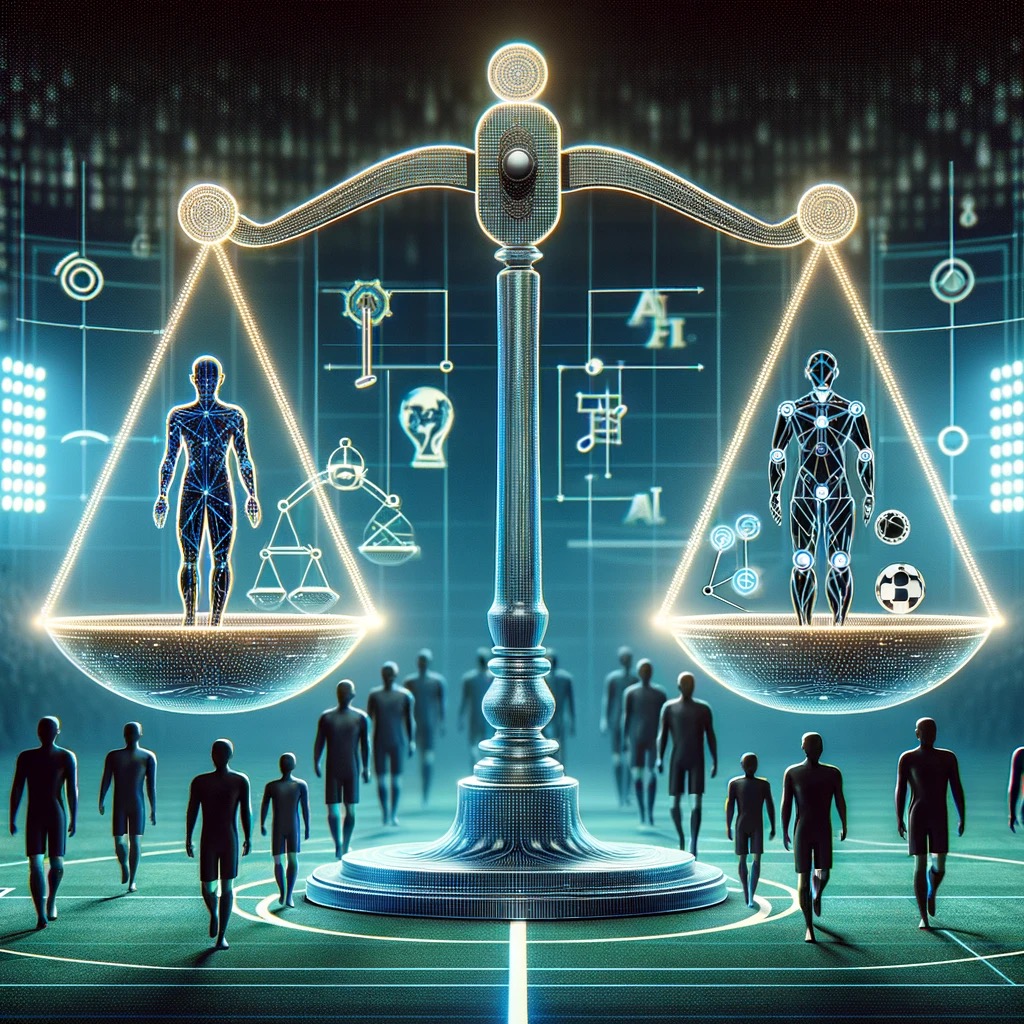
While integrating Artificial Intelligence (AI) in sports offers transformative benefits, it also introduces various challenges and ethical considerations.
These issues span data privacy, fairness in AI applications, the impact on traditional sports roles, and broader moral concerns.
Addressing these challenges is crucial for ensuring the responsible and equitable use of AI in sports, maintaining the integrity of competition, and safeguarding the interests of all stakeholders.
Data Privacy and Security
The extensive use of data in AI-driven sports applications raises significant privacy concerns.
Athlete performance data, health metrics, and fan engagement insights must be handled with strict confidentiality and security measures to prevent unauthorized access and potential misuse.
Data privacy involves complying with legal standards such as GDPR in Europe, securing data transmission and storage, and maintaining transparency with athletes and fans about how their data is used.
Fairness and Bias in AI Applications
AI algorithms are only as unbiased as the data they are trained on, leading to potential issues of fairness and bias.
In sports, this could manifest in biased performance evaluations, unfair athlete comparisons, or skewed game strategies based on incomplete or biased data sets.
Ensuring fairness requires rigorous algorithm testing, diverse data sets for AI training, and continuous monitoring for unintended biases, ensuring that AI applications contribute to fair and equitable sports practices.
Impact on Traditional Roles and Employment
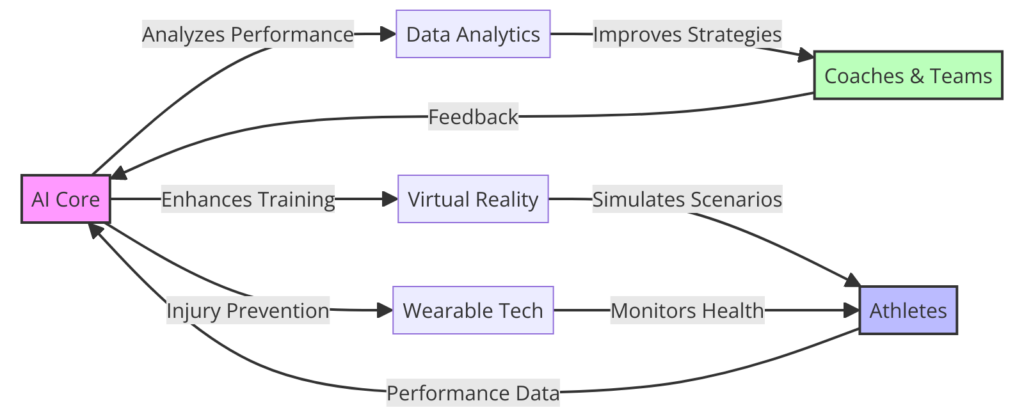
The automation capabilities of AI could disrupt traditional sports roles, such as scouts, analysts, and even some coaching functions.
While AI can enhance decision-making and strategic planning, there is concern about the devaluation of human expertise and experience, which have always been central to sports.
Balancing AI integration with preserving and evolving traditional roles is vital, ensuring that technology complements rather than replaces human judgment and creativity.
Ethical Use of Performance Data
The ethical use of athlete performance data is a significant concern. While such data can optimize training and improve performance, it also raises questions about the limits of data-driven optimization and the pressure it places on athletes.
There is a fine line between using data for improvement and subjecting athletes to excessive surveillance and control.
Establishing ethical guidelines for using performance data, focusing on athlete consent and welfare, is essential.
Ensuring Accessibility and Inclusivity
The benefits of AI in sports should be accessible to all, from elite professional leagues to grassroots organizations.
However, the cost and complexity of AI technologies could widen the gap between well-resourced teams and those with limited access to advanced tools.
Promoting inclusivity involves developing affordable and scalable AI solutions and ensuring that emerging sports technologies are accessible to various sports organizations.
Case Studies: Navigating Ethical Challenges
- Wearable Technologies in Professional Leagues: Several professional sports leagues have introduced guidelines and agreements with players’ associations regarding the use of wearable technologies and the handling of the data they generate, ensuring that players’ privacy and rights are respected.
- Bias in Player Selection Algorithms: Research into AI systems used for player selection and scouting has highlighted the potential for bias, prompting sports organizations to re-evaluate their data sources and algorithmic models to ensure fairness and objectivity in player evaluation.
While offering numerous advantages, integrating AI in sports presents many challenges and ethical considerations.
Navigating these issues requires collaboration among technology developers, sports organizations, athletes, and fans to ensure that AI technologies are used responsibly, ethically, and equitably.
By addressing concerns related to data privacy, fairness, the impact on traditional roles, and the ethical use of performance data, the sports industry can harness the full potential of AI to enhance performance, engagement, and the overall sports experience while maintaining the integrity and spirit of competition.
7. The Future of AI in Sports
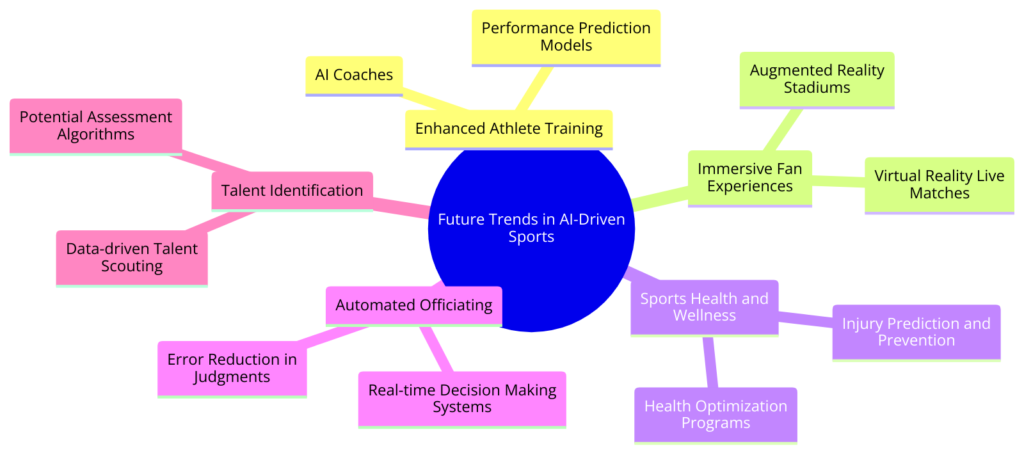
The future of Artificial Intelligence (AI) in sports is poised on the brink of revolutionary advancements, promising to reshape further how sports are played, coached, managed, and enjoyed.
Emerging trends and advancements in AI technologies are set to deepen the integration of data-driven insights and automation across all facets of sports, from performance analysis and fan engagement to sports medicine and content creation.
Emerging Trends in AI Sports Technologies
- Advanced Player Tracking and Performance Analytics: Future developments in AI will push the boundaries of player tracking and performance analytics, offering even more granular insights into athlete movements, strategies, and health. Technologies like computer vision and machine learning will enable real-time biomechanics analysis, providing immediate feedback to athletes and coaches for on-the-spot adjustments.
- Predictive Analytics for Injury Prevention: AI’s role in predicting and preventing injuries will become more sophisticated. It will leverage vast datasets to identify subtle precursors to common sports injuries. By integrating genetic information, training load data, and psychological factors, AI models could predict injury risks with unprecedented accuracy, leading to personalized training and recovery programs.
- Enhanced Fan Experience Through Augmented Reality (AR) and Virtual Reality (VR): With advancements in AR and VR powered by AI, the fan experience is set to become even more immersive. Fans could experience games from the athlete’s perspective, explore virtual stadiums, or receive AR-enhanced stats and information in real-time during live events, bridging the gap between remote viewership and in-stadium experiences.
- AI in Sports Medicine and Rehabilitation: The application of AI in sports medicine will expand, offering novel approaches to rehabilitation and recovery. AI-driven simulations and robotics could provide personalized rehab programs, while AI algorithms might predict recovery timelines, optimizing the return-to-play process for injured athletes.
Predictions for AI’s Impact on Sports Practices and Experiences
- Customized Training and Development: AI will enable highly customized athlete training programs that account for individual strengths, weaknesses, and injury histories. This personalization will optimize athletic performance and extend career longevity by minimizing injury risks.
- Automated Officiating and Rule Enforcement: AI could play a more prominent role in officiating, using real-time data analysis to make calls on fouls, offsides, or out-of-bounds plays, reducing human error and improving the fairness of competitions.
- Global Talent Identification: AI’s analytical capabilities will revolutionize talent scouting, identifying promising athletes from across the globe by analyzing performance data from local leagues and competitions and democratizing access to professional sports opportunities.
Challenges and Ethical Considerations
As AI technologies advance, so will the challenges and ethical considerations associated with their use in sports.
Issues around data privacy, algorithmic bias, and the digital divide will require ongoing attention and innovative solutions to ensure that AI’s benefits in sports are equitably distributed and do not compromise the integrity of athletic competition.
The future of AI in sports is bright, with emerging technologies promising to enhance every aspect of athletic performance and the spectator experience.
As AI becomes more intertwined with the sports industry, its potential to revolutionize practices, experiences, and even the sports business is immense.
However, realizing this potential will require carefully navigating advanced technologies’ challenges and ethical considerations.
Encouraging collaboration between technologists, sports professionals, and regulatory bodies will be vital to harnessing AI’s capabilities responsibly and effectively, ensuring a future where sports are not only more exciting and accessible but also fairer and more inclusive.
8. Conclusion: The Transformative Role of AI in Sports
The exploration of Artificial Intelligence (AI) in sports reveals a landscape transformed by technology, where the boundaries of athletic performance, fan engagement, and sports management are continually expanded through innovation.
AI has revolutionized traditional practices and introduced new paradigms in how sports organizations operate, athletes train, and fans participate in the sporting experience.
While driven by the pursuit of excellence and efficiency, this transformation also underscores the importance of navigating the ethical and practical challenges accompanying integrating advanced technologies in sports.
The impact of AI on sports is multifaceted.
It enhances athlete performance through detailed analytics, predictive modeling, and personalized training regimens.
AI’s role in injury prevention and sports medicine promises healthier and longer careers for athletes, emphasizing the importance of well-being alongside competitive success.
For fans, AI has enriched the viewing experience, offering personalized content, immersive experiences through AR and VR, and interactive platforms that bring them closer to the teams and athletes they admire.
Looking forward, the potential of AI in sports is boundless.
Emerging trends suggest a future where AI-driven technologies offer more sophisticated insights into performance analytics, revolutionize fan engagement with more immersive experiences, and open new frontiers in sports medicine and rehabilitation.
However, realizing this potential will require addressing the challenges of data privacy, fairness, and inclusivity head-on, ensuring that the benefits of AI are accessible to all stakeholders in the sports ecosystem.
The journey of AI in sports symbolizes the broader impact of technology on society. Technology offers immense benefits but poses significant challenges that must be thoughtfully managed.
As we stand on the cusp of further innovations, the sports industry must continue embracing AI as a tool for competitive advantage and as a catalyst for a more inclusive, engaging, and health-conscious sporting world.
In conclusion, AI’s transformative role in sports is undeniable.
It marks a new era of data-driven decision-making, personalized athletic development, and fan-centric experiences. Encouraging ongoing innovation while fostering responsible use of AI will be crucial in navigating the future sports landscape.
As AI technologies evolve, so will the strategies, policies, and ethical considerations that govern their use, ensuring that the spirit of competition and the joy of sports remain at the heart of this technological revolution.
FAQ & Answers
1. How is AI in sports, how is it used?
AI is used for performance analysis, injury prevention, game strategy development, enhancing fan experiences, and automating sports content creation.
2. What are the challenges of implementing AI in sports?
Challenges include ensuring data privacy, maintaining fairness, and balancing technology with human insights in sports strategies.
Quizzes
Quiz 1: “AI in Sports Technology” – Identify AI technologies used in various sports applications.
Let’s explore how AI technologies are applied across different sports applications. Here are several scenarios where AI plays a crucial role. Your task is to identify the specific AI application or technology being used in each case:
- Performance Analysis: Coaches use an AI system to analyze video footage of games and training sessions, providing detailed analytics on player movements, tactics, and overall team performance. This information helps in making strategic decisions and improving player performance.
- Injury Prevention: An AI application collects and analyzes data from wearable devices worn by athletes, predicting the risk of injuries based on their physical activity, workload, and health metrics. This proactive approach helps in reducing the incidence of injuries.
- Fan Engagement: A sports franchise employs AI to analyze fan behavior and preferences from social media interactions, ticket purchases, and app usage. This data drives personalized marketing strategies, enhances fan experiences, and increases engagement through targeted content and recommendations.
- Event Management: AI technology optimizes the scheduling and logistics of sports events, taking into account factors such as weather conditions, audience size, and traffic patterns. This ensures a smooth experience for both participants and spectators.
- Referee Assistance: In certain sports, AI-powered systems assist referees by providing real-time analytics and replay capabilities to help make accurate calls. These systems can analyze the trajectory of the ball, player positions, and other game dynamics that are challenging to assess in real-time.
Identify the AI applications or technologies used in each of these sports scenarios.
Here are the AI applications or technologies being utilized in the described sports scenarios:
- Performance Analysis: The technology is AI-driven Video Analysis. This application uses machine learning algorithms to process and analyze video footage, offering insights into player movements, game strategies, and overall team dynamics to improve training and performance.
- Injury Prevention: This scenario employs Predictive Analytics in Sports Health. By analyzing data from wearable devices, AI models predict injury risk based on various health and activity metrics, enabling preventative measures to be taken before injuries occur.
- Fan Engagement: The application is AI in Fan Behavior Analysis. AI algorithms analyze data from various fan interactions to understand preferences and behaviors, allowing teams and franchises to personalize marketing efforts and enhance the fan experience through targeted content.
- Event Management: This involves AI for Sports Event Logistics Optimization. AI technology considers multiple factors like weather, anticipated attendance, and local traffic to optimize the scheduling and logistical planning of sports events, ensuring a smooth operation.
- Referee Assistance: The technology is AI-Assisted Decision Support Systems for Referees. These systems provide real-time data and video replay analysis to assist referees in making more accurate decisions, analyzing ball trajectories, player positions, and other critical moments in the game that might be missed in real-time.
Each of these AI applications demonstrates the potential to enhance various aspects of sports, from improving athlete performance and health to enriching the fan experience and ensuring the fairness and excitement of the competition.
Quiz 2: “Innovations in Sports” – A quiz on recent AI innovations and their impact on sports.
For each innovation described, try to identify the specific application or the type of AI technology being discussed:
- Real-time Strategy Optimization: An AI system that provides coaches and players with real-time strategy recommendations during a game. It analyzes live data from the match, including player positions, opposition strategies, and current game statistics, to suggest tactical adjustments.
- Dynamic Ticket Pricing: This AI-driven platform analyzes various factors such as demand, season, weather, and team performance to dynamically adjust the pricing of game tickets. It helps maximize revenue for sports organizations and improves the ticket purchasing experience for fans.
- Automated Sports Journalism: An AI application that automatically generates news articles, reports, and summaries of sports events. It processes data from games, including scores, player performances, and key moments, to produce comprehensive reports immediately after an event concludes.
- Athlete Mental Health Monitoring: Using AI to analyze speech patterns, social media activity, and behavioral data, this system identifies potential mental health issues among athletes. It provides early warnings to coaches and medical teams, allowing for timely intervention and support.
- Enhanced Viewer Experiences: AI technology that personalizes the viewing experience for fans watching sports broadcasts. It offers tailored camera angles, virtual reality (VR) experiences, and customized commentary based on viewer preferences and past viewing behavior.
Identify the specific AI innovation or technology used in these recent sports applications.
Here are the specific AI innovations or technologies being described in the recent sports applications:
- Real-time Strategy Optimization: This innovation involves AI for Live Game Analysis and Tactical Recommendations. It leverages machine learning to analyze ongoing match data, offering coaches and players insights and strategies to adapt their tactics in real time, enhancing competitive edge.
- Dynamic Ticket Pricing: The technology is AI-driven Dynamic Pricing Models for sports events. By considering factors like demand, weather, and team performance, AI algorithms dynamically adjust ticket prices to optimize revenue and ensure a fair pricing strategy that benefits both the sports organizations and fans.
- Automated Sports Journalism: This application uses Natural Language Generation (NLG) for Sports Reporting. AI processes game data to automatically generate news articles and reports, providing timely and comprehensive coverage of sports events without the need for human input immediately after the events.
- Athlete Mental Health Monitoring: The innovation here is AI in Mental Health and Well-being Monitoring for Athletes. By analyzing indicators from speech, social media, and behavior, AI helps in early detection of mental health issues, facilitating prompt support and intervention by professionals.
- Enhanced Viewer Experiences: This involves Personalized AI for Sports Broadcasting, including custom camera angles and VR experiences. AI tailors the broadcast based on individual viewer preferences, enhancing engagement and providing a unique, immersive viewing experience.
Each of these AI innovations demonstrates how technology is being used to enhance various aspects of sports, from improving the game and strategy to supporting athletes’ mental health and revolutionizing how fans engage with sports content.